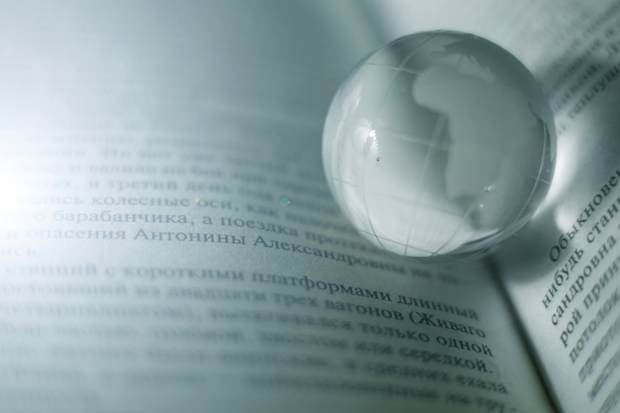One day in 2011, while perusing her bookshelves, Ann Morgan realised her reading habits were (to her surprise) somewhat parochial. No worse than most English-language readers’, perhaps, but still with dramatic, unnecessary bias towards the Anglophone, with only Freud and a single battered Madame Bovary representing the other 90-odd per cent of the global population. Morgan prescribed herself a corrective, embarking on a 12-month course of reading one book from each country of the world. (Which is how many, exactly? We’ll come to that…) The experience was recorded on her blog, ayearofreading-theworld.com, and is now synthesised into this brilliant, unlikely book.
Reading the World isn’t a narrative account of Morgan’s quest, though, nor a collection of amusing observations about each national representative in turn. Indeed, the very idea that chosen texts directly ‘represent’ their nations is usefully problematic. Literature is a disorderly and wilful thing, after all; it doesn’t go where you want it, and doesn’t stay within the lines. Rather, Morgan’s book is an attempt to understand what her exploratory reading reveals about the world, and the place of writing in it.
The insularity of English-language publishing posed a problem, however — many countries have nothing available in English at all, or if something exists, it’s practically impossible to track a copy down. Need to lay hands on a novel, readable in English, from Montenegro? Well, then you’ve got a problem, if your project aspires to a delusion of completeness. The solution, Morgan found, was an internet packed with eager helpers, offering suggestions and popping copies in the post. (When one trail failed to yield results, a group of translators even pitched in and translated a book specially to help her along. São Tomé and Principe now has its first book in English.)
There were other problems, too: those countries where oral storytelling has primacy, or where it’s hard to be a writer at all, under censorship and other political pressures, or due to an absence of publishing infrastructure (consider South Sudan, then only six months old).
For Morgan, books — and the processes of discovering and selecting them — are symptomatic, indicating a restoration of post-imperial identity, or the power-play between languages, or new technologies and how they may change how we all read; so this book is about all these. Politics, too — the very question of which ‘countries’ Morgan should read is a fundamentally political one; any definition, any list is contestable, an unstable, corrupted product of one ideological position.
Indeed, the selection even changed during the year — Palestine being swapped in for Kosovo — with a final total of 196 countries, plus Kurdistan as a wild-card territory (narrowing beating Catalonia in an online poll). These 196-plus-one add up to… what? The word Weltliteratur, given currency by Goethe, is helpful here; it’s not a collection of national literatures but a literature that transcends national boundaries, a global literary conversation.
Morgan extends the basic questions of readerly empathy to consider the likelihood of any resulting behavioural change, especially with stories that serve to complicate our two-dimensional, cartoony version of certain cultures (North Korea, anyone?). Readers have a tendency to cleave to the familiar, books leading us on to other similar books domino-like, but Reading the World explores how exactly one might read unfamiliarly. How might readers approach the unreassuring, contextless, anchorless? How might we resist culture shock, avoid being too fearful of getting it wrong, or too indignant at a book’s refusal to be obligingly comprehensible? Watching Morgan’s prejudices being dismantled, her simplifications complicated, her openly admitted complacency and ignorance challenged, is all the more fascinating and salutary if we recognise their resemblances to our own.






Comments